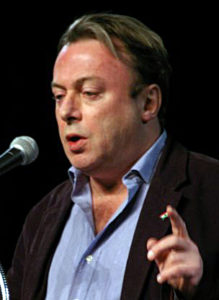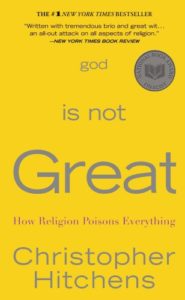God’s not so great. If this is the case, why expend time and effort to try and prove it? Judging by its size, it would appear “God’s Not So Great” was a relatively significant undertaking by its author. The fact that he’s so obsessed with the topic leads one to question his sincerity in exploring the subject in the first place.
It’s generally known that publishers put out such books with the expectation that controversy will generate sales, but I think this time they may discover that some controversial topics are but worthy of a yawn. As all other books of its kind, I see it headed for oblivion in the not so distant future.
The Intriguing Part of The God’s Not So Great
What I find intriguing about “God’s Not So Great” is not its content but the fact that someone spent the time writing it. It is both an irony and paradox that God gave us such wonderfully complex minds that we can understand who He is, and refute His existence in the same breath.
 In the Bible, it says: “The fool has said in heart, there is no God”. The person who acknowledges His existence, but thinks that He’s “not so great” is perhaps one notch above this. There’s not much point in discoursing with a fool because it does him no good, but it demeans those trying to reason with him. I mention this because there need to be basic premises in life on which we build logic. If a foundation is flawed, the building will not stand. This is especially true with non-fiction books involving any “reasonable” subject matter.
In the Bible, it says: “The fool has said in heart, there is no God”. The person who acknowledges His existence, but thinks that He’s “not so great” is perhaps one notch above this. There’s not much point in discoursing with a fool because it does him no good, but it demeans those trying to reason with him. I mention this because there need to be basic premises in life on which we build logic. If a foundation is flawed, the building will not stand. This is especially true with non-fiction books involving any “reasonable” subject matter.
The Catch of Hitchens’ Book Title
Hitchens bases his entire book on the droll postulation that “God did not make us, we made Him”. Obviously his book’s title does not represent his viewpoint but is merely intended to catch people’s attention.
I’ve never met the author, so I don’t want to make a value judgment, but someone who can say God’s not so great has never thoroughly thought Him through, or personally experienced Him. As he himself indicates, bad experiences in religious schools can sometimes hinder, not enhance our perception of God. Now he ironically seems to think that religion poisons everything, in spite of the fact that most hospitals and learning institutions of the Western World were founded by Christians.
Much of “God’s Not So Great” is personal ranting consisting of historical and cultural assertions with no foundation other than opinion. At one point, I found myself taken aback by one such assertion in which he claimed that intelligent scientists of past ages were theists out of expediency because they needed to survive in their cultural context. What nonsense!
 Here’s another gem: “Since human beings are naturally solipsistic, all forms of superstition enjoy what might be called a natural advantage”. What a simplistic view of humanity, and what arrogance, I might add.
Here’s another gem: “Since human beings are naturally solipsistic, all forms of superstition enjoy what might be called a natural advantage”. What a simplistic view of humanity, and what arrogance, I might add.
To top the cake, Hitchens at one point makes this generalization about Christians: “Why does such a belief not make its adherents happy”? He refers to his observation of people at church gatherings he’s been at. There’s a temptation to say that I don’t want to dignify this with a response. Nonetheless, I will say that Hitchens needs to get out a little more to check out some of the churches where people do indeed worship “in spirit and in truth”.
That’s my assessment of “God’s Not So Great”. Obviously, I think this can’t be further from the truth. But apparently Christopher Hitchens is a well-known writer, so you might want to check him out for yourself.
https://www.youtube.com/watch?v=T2TQc3gFQf8






